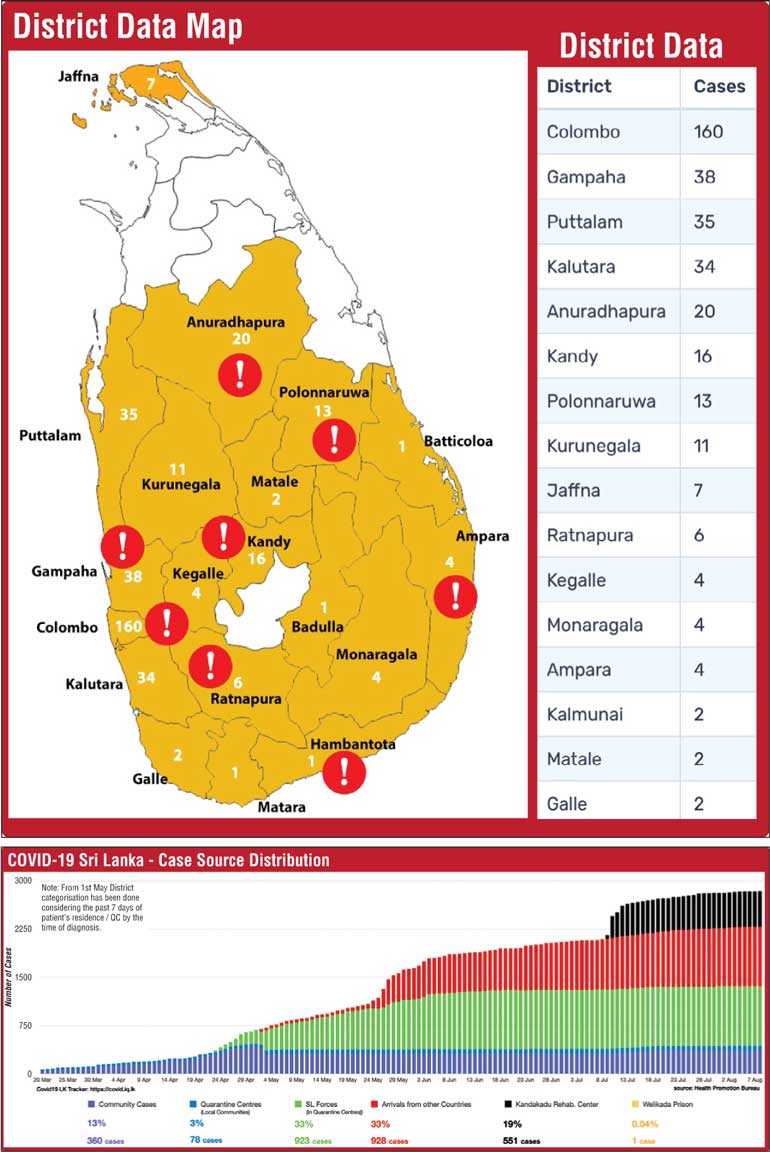Saturday Feb 07, 2026
Saturday Feb 07, 2026
Wednesday, 12 August 2020 00:08 - - {{hitsCtrl.values.hits}}

Strong leadership on COVID-19 helped the Government at the elections

Let’s accept it, the earliest that the world will have access to a vaccine against COVID-19 will be at least a six months from now, the logic being that the current shortlisted probable products that have shown  some promise will have to pass the third stage trials on humans, which will take an incubation period of three to four months. Thereafter, for commercialisation which includes setting up of production facilities and the logistical chain means this time line of six to eight months looks the most practical, which means that we have no option but learn to live with COVID-19.
some promise will have to pass the third stage trials on humans, which will take an incubation period of three to four months. Thereafter, for commercialisation which includes setting up of production facilities and the logistical chain means this time line of six to eight months looks the most practical, which means that we have no option but learn to live with COVID-19.
This comes in the backdrop of India crashing under the pressure of the virus with a record 864 cases during a day with a spread rate of 3.2%. Maldives is also facing a tough challenge with 134 cases daily and the economy sinking at -5.5% in the last quarter. In this background the only attitude that we need to have to face reality is that the shape of the virus will keep changing and we must be open to ideas and new ways of working to live with the COVID-19 virus. We should not get into a mode of fighting it as at the end of the day we cannot kill it until a vaccine comes into being. Hence the more prudent approach would be to adjust and learn how to live with it.
Reality – SL vs. the rest
In this backdrop, we in Sri Lanka must be proud of the fact that only 11 have died and overall the management of COVID-19 virus has been well executed, even though there is ambiguity on the current status as speculated due to the elections staged last week.
To be specific the global fatality rate is at 3.9% whilst the US at 3.4%, India at 2.2% and Sri Lanka is at a commanding 0.4% which is a fact that no one can dispute. The performance of Sri Lanka can be attributed to the strong structural infrastructure of the country’s health system, timely leadership and a broadly responsive population of 21 million people. It is a fact that the 145-seat victory was possible only because of the Government managing the COVID-19 pandemic that gave confidence to the Sri Lankan voter.
From a global sense the overall statistics on those affected with the virus are not so positive, with 19 million people affected and 0.74 million deaths whilst the US Government has accepted that the situation is termed out of control with 164,000 deaths and estimated to cost the country 0.25 million lives before leaving the people of America. If we dig deeper we will see once again that Sri Lanka is the best on recovery rates with 76.2%, India at 64% and US the lowest performing at 47%.
Whilst the above is factual in nature the issue at hand is that the economy has declined by -1.6% in Q1, 2020 which is in fact pre-COVID. This means that the real impact will only hit Sri Lanka in Q2, 2020 and best estimates coming out is that Sri Lanka will register a -3% to - 4% GDP growth which means that we are heading for a recession this year. Apparel exports will get a hit of $ 2 billion this year and Tourism will be at around a $ 1.5 billion decline. Things will be rough in Q3 and Q4 and we have to brace for tough times.
Will it cost the elections?
If we look at a country like the US which has data for public consumption, the situation in the US is critical as things are out of control in California, Michigan, Florida and Arizona. The three latter ones are key states in the US elections. The approval ratings of how Trump is handing the COVID-19 virus is at just at 25% in Arizona, 38% in Florida and 36% in Michigan.
These three states are key blue band states that President Trump won handsomely at the last election. As at today his competitor Joe Biden is leading the race in the three states which are indications that Trump is in trouble for at the November elections unless he changes strategy.
What Sri Lanka must do
The situation in Sri Lanka can be said to be way above the pandemic challenges that the world is up against even with all the issues raised by the Opposition on the COVID-19 virus. Has the status of Sri Lanka moved from 3b to stage 4?
There is much speculation but I guess post the elections on 5 August Sri Lanka will get a better view of the reality. The most practical way to look at the issue right now is ‘how do I live with COVID-19?’ Let me do a deep dive on this perspective.
1) Make people closer to the problem with education
Education comes in many forms such as trainings, team building exercises, workshops, training courses and brain storming sessions just to name a few. The goal of educating employees is to make them aware of their own unconscious bias, instil a new perspective like wearing masks/washing hands for 20 seconds/keeping a one-metre distance, for instance. The approach of educating people helps the people understand that COVID-19 is a common problem that requires a team approach to solving.
In the education process you will notice that it will bridge the gaps and strengthen relationships on the task of ‘living with COVID-19’. For instance, if one is feeling sick with headaches/throat ache or runny nose, then it’s best to stay at home rather than putting the whole team at risk. This will require maturity and responsibility which will come from the approach of educating employees. Leaders, especially middle managers, need to be fully on-board and dedicated to educating themselves and being aware of their own unconscious bias to COVID-19. Drinking koththamalli is said to boost immunity and the BCG vaccine tends to give a herd immunity but yet these are at hypothesis stage rather than being actually proven. Given this background the HR departments must remain committed to exploring various learning opportunities to keep the leadership of the company and employees engaged in learning on the development of COVID-19. The reason being, there is so much of knowledge coming in from the US and India which can be accessed via CNN and NDTV for instance. The only inhibitor is that one must have a learning mind. This is the new thinking required which is why it’s prudent to theme the current reality as ‘Living with COVID-19’.
2) Supportive workplace
Getting your company ‘COVID-19 Control Environment’ certified by SLSI will make the staff feel that the work place is safe to attend. You have to make the office safer than one’s house. For instance all vehicle tyres must be sanitised before entering the premises.
\The other key steps include sanitising carpets, having to wash hands before entering the office, sanitiser liquid can be seen visually in key locations inside the company. Some go to the extent of cleaning door handles at least three times a day and a temperature chart is maintained, which means that an employer is doing one’s best to maintain strong hygiene and sanitation levels inside office. This is the supportive structure required to help a person ‘live with COVID-19’.
Ally-ship is another fundamental that helps support an individual during a pandemic. Creating healthier and more positive work environments is a must, given the stress levels that exist due to the pandemic. Employees should feel heard and comfortable to freely voice their feelings, opinions and concerns without the fear of retaliation as some families are naturally very sensitive to germs and illnesses.
The most important this is that people must feel confident that their workplace supports and even if one gets COVID-19 that they will not be shunned. Some companies are already training staff members in the event a colleague gets this virus how they need to be treated and how one can practice self-quarantine. They have in fact documented the legal procedures about having to go to a quarantine centre or IDH for treatment
3) Practice collective accountability
A point to note is that every company has a culture which has rules that must be abided by in order to keep the workplace functioning and healthy. The new culture inside the company must be such that, COVID-19 new norm violators should face the consequences, regardless of their rank or title. Turning a blind eye to one situation in toxic cultures is a sure indication that you have not made the company responsive to the current pandemic challenge.
Leadership and management are the ones who set the tone of the culture and employees, candidates and consumers look to them to see if they’re practicing what they preach which is what we see the biggest problem that organisations are faced with. Most top leaders do not like their temperatures being checked, which needs corrected. If we don’t pledge to practice the new norms we will end up like some parts of India where COVID-19 has become unmanageable.
4) Review the current procedures
Just like during the LTTE terror times where dummy terrorists were sent to organisations to check security levels, today these same tests must be done to check the procedures in relation to COVID-19. The best example is the rehabilitation centre at Kandakadu which was up to the point of getting the ISO certification level but yet an infected person slipped through the system and more than 300 people got infected. This can happen to any one of our organisations and we have to ensure all leakages are tightened for the next 12-18 months. At the end of the day we have no option but learn to live with COVID-19. Hence, regular audits will become a way of life in today’s companies.
5) Be honest about goals, progress and shortcomings
Traditionally, companies kept employees in the dark about what was happening internally. As a result, employees never felt like they were valued. But today, given that the problem is more a human discipline issue, the importance of an employee is once again top of mind. Given this issue the management must be transparent on the current procedures and what the issues are. It could be wearing a mask at a usual meeting to keeping a one metre distance during the tea break. Unless the culture is open to the set goals and accepting the weaknesses we cannot have a situation where ‘living with COVID-19’ can become a reality.
Conclusion
The above are some strategies that can be practiced so that we can learn to live with COVID-19. If a country has deep pockets it can fund total lockdowns but if we open a country too early then the economy can bounce back but at the expense of more lives. Hence the management of COVID virus is more a math game, which is why countries like USA using AI predict that 240,000 people will die from the virus whilst as at now the number stands at 146,000.
(The writer is a CEO of an Artificial Intelligence company in the South Asian region. The thoughts are strictly his personal views.)